In 2025, intraday futures trading demands precision, speed, and the right tools. Choosing the right broker can make or break your trading success. This guide highlights the 7 best brokers for intraday futures trading, focusing on execution speed, platform features, costs, and support.
Top Brokers:
- NinjaTrader: Known for its fast execution, advanced tools like SuperDOM, and custom indicator development.
- AMP Futures: Offers low commissions, multiple platform options, and direct trade execution.
- Interactive Brokers: Provides institutional-grade tools, SmartRouting technology, and competitive pricing.
- Optimus Futures: Transparent pricing, direct market access, and personalized support.
- Tradovate: Simplified, mobile-friendly trading with cloud-based access.
- TradeStation: Advanced analytics, EasyLanguage for custom strategies, and reliable execution.
- Webull: User-friendly mobile app, transparent pricing, and paper trading for beginners.
Key Takeaways:
- Fast Execution: NinjaTrader and Interactive Brokers lead in speed.
- Low Costs: AMP Futures and Tradovate offer budget-friendly options.
- User-Friendly: Webull and Tradovate cater to newer traders.
- Advanced Tools: NinjaTrader and TradeStation provide high-end features for experienced traders.
Quick Comparison Table:
| Broker | Best For | Execution Speed | Fees | Platform Features | Support |
|---|---|---|---|---|---|
| NinjaTrader | Advanced tools, scalpers | Ultra-fast | Tiered commissions | Custom indicators, SuperDOM | Market-hour support |
| AMP Futures | Cost-conscious traders | Reliable | Low commissions | Multiple platforms | 24/7 support |
| Interactive Brokers | Institutional-level trading | Fast | Volume-based discounts | SmartRouting, global access | Market-hour support |
| Optimus Futures | Transparent pricing | Reliable | Simple pricing | Multi-platform options | Dedicated managers |
| Tradovate | Mobile-first traders | Fast | Straightforward pricing | Cloud-based, easy to use | Limited hours |
| TradeStation | Advanced analytics | Fast | Discounts for volume | Custom tools, EasyLanguage | 24/5 support |
| Webull | Beginners, mobile traders | Reliable | $2.09/contract | Level II data, paper trading | Limited hours |
Pro Tip: Test demo accounts to find the broker that fits your trading style and goals.
Best Futures Trading Platforms | My Top 3 For Day Traders
1. NinjaTrader
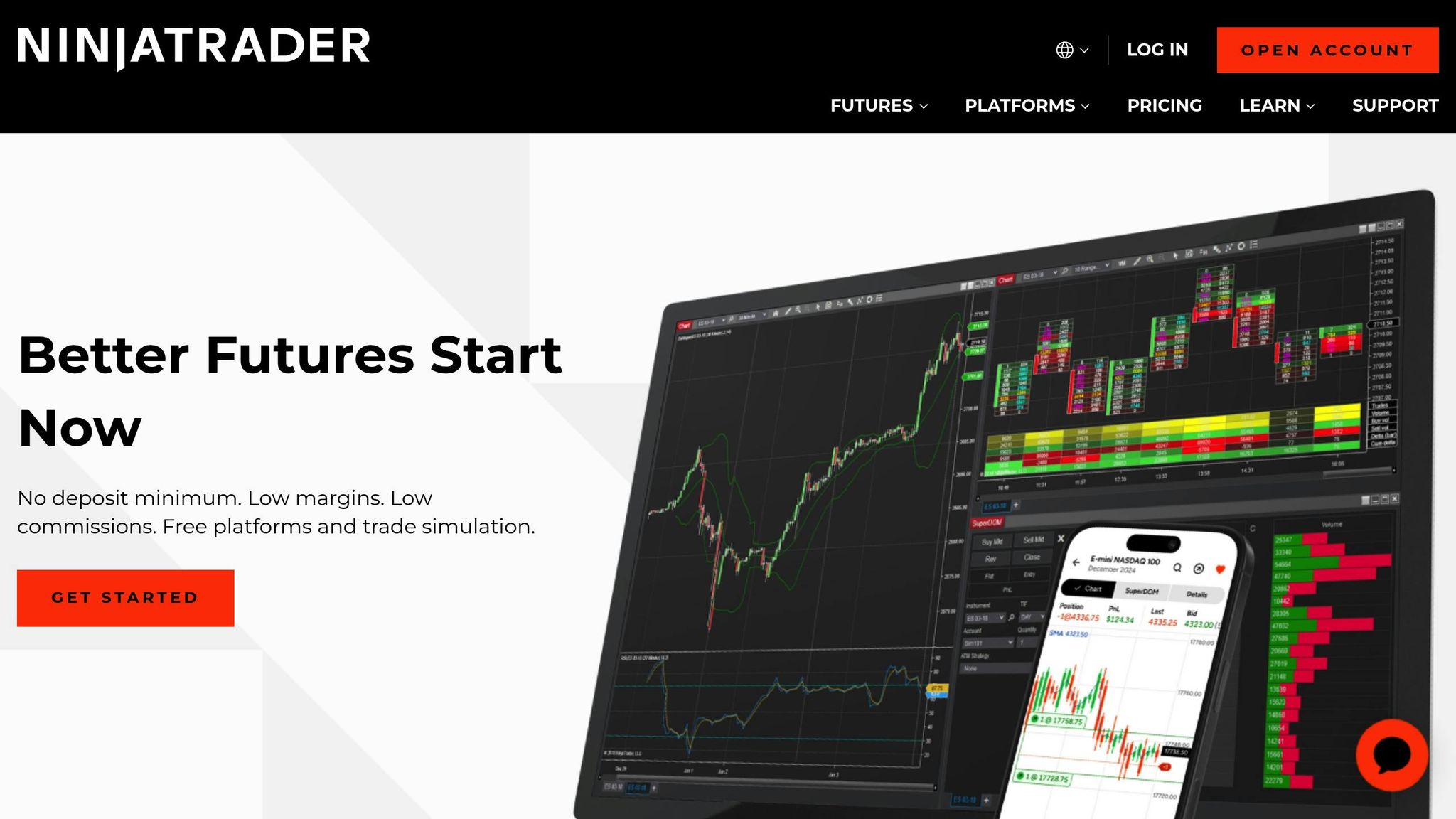
NinjaTrader stands out as a go-to platform for active futures traders, known for its reliable infrastructure tailored to both retail and professional intraday trading.
Execution Speed
NinjaTrader’s order execution is built for speed. With servers located directly in exchange data centers, the platform minimizes latency, ensuring fast order processing on highly liquid contracts like the ES (E-mini S&P 500) and NQ (E-mini NASDAQ).
The SuperDOM interface provides real-time level II data and market depth, which is vital for scalpers navigating high-volatility markets where every tick can make a difference. This emphasis on speed and precision complements NinjaTrader’s robust suite of trading tools.
Platform Features
NinjaTrader 8 offers a comprehensive set of features designed to meet the needs of serious traders. It includes:
- Advanced order management tools
- Built-in technical indicators
- Multi-timeframe chart analysis
- One-click order placement with the Chart Trader feature
The Market Analyzer lets traders scan multiple futures contracts in real time using custom criteria, while the Strategy Builder enables algorithmic trading without requiring coding skills. For those with programming expertise, the platform supports custom indicator development using C#.
NinjaTrader also provides advanced order types like OCO (One-Cancels-Other), bracket orders, and trailing stops, all of which are essential for managing risk in fast-paced markets. Additionally, the platform supports multi-monitor setups, making it easier to track multiple markets or manage complex strategies like spread trading.
On top of its powerful tools, NinjaTrader remains mindful of cost efficiency for its users.
Fees and Margins
NinjaTrader employs a commission-based pricing model with tiered rates that reward active traders. Competitive margin requirements, real-time margin calculations, and automatic position sizing tools help traders make the most of their capital.
For live trading, NinjaTrader offers a leasing model, with fees waived if monthly commissions reach a specified threshold. This flexible pricing structure is designed with active traders in mind.
Customer Support
NinjaTrader provides market-hour support through live chat, phone, and email, staffed by professionals knowledgeable in intraday trading strategies.
The platform also offers a wealth of educational resources, including daily live webinars covering futures trading techniques and platform optimization. Its Help Center features detailed articles addressing common trading scenarios and platform configurations.
For traders needing top-tier performance, NinjaTrader integrates seamlessly with QuantVPS hosting solutions, offering ultra-low latency connectivity with response times as fast as 0–1ms.
2. AMP Futures

AMP Futures stands out by offering direct trade execution and a wide range of platforms tailored for intraday futures trading. Let’s dive into their execution process and platform options.
Execution Speed
AMP Futures operates with a Straight Through Processing (STP) model, which directly routes orders to exchanges. This setup minimizes delays and provides real-time market data. Traders can access four key data feeds – CQG, Rithmic, TT (Trading Technologies), and Teton – chosen for their ability to deliver fast and dependable market updates.
Platform Features
With over 50 platforms available, AMP Futures gives traders a variety of choices to match their preferences. Popular options include NinjaTrader, Rithmic, QuanTower, MultiCharts, Sierra Chart, and Bookmap. This flexibility ensures there’s a platform suited to every trading style.
3. Interactive Brokers
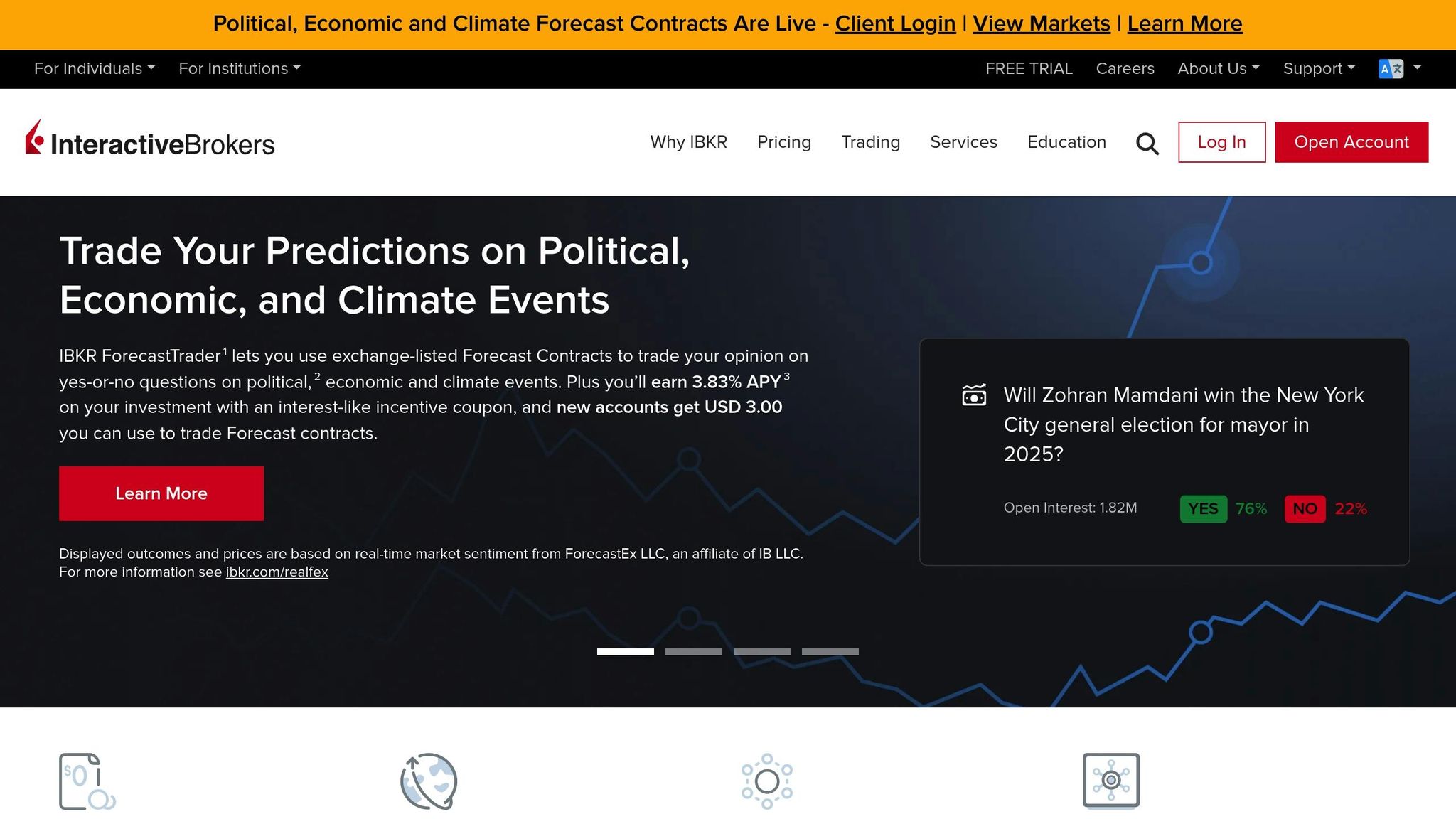
Interactive Brokers stands out as a top choice for serious intraday futures traders, offering institutional-level tools and competitive pricing. Its focus on speed, efficiency, and robust features makes it a go-to platform for those who demand precision and performance.
Execution Speed
Interactive Brokers employs an advanced order routing system that connects traders to major exchanges worldwide. With its SmartRouting technology, orders are optimized for execution across key exchanges, and strategically placed data centers help reduce latency, ensuring faster trade execution.
Fees and Margins
When it comes to costs, Interactive Brokers offers a competitive edge. Traders benefit from volume-based commission discounts, flexible margin requirements, and a portfolio margining system designed to maximize capital efficiency for diverse strategies.
Platform Features
The Trader Workstation (TWS) platform is packed with tools for advanced trading. It includes features like detailed charting, market scanning, real-time profit and loss tracking, and comprehensive order management. Traders can also use a variety of order types, including algorithmic orders. For those on the move, the IBKR Mobile app brings much of the same functionality, allowing effective management of positions from anywhere.
Customer Support
Interactive Brokers provides support during market hours through phone, live chat, and email, with regional teams ready to assist. Additionally, its educational resources, such as webinars and the Traders’ Academy, offer valuable guidance tailored to the needs of active traders.
4. Optimus Futures
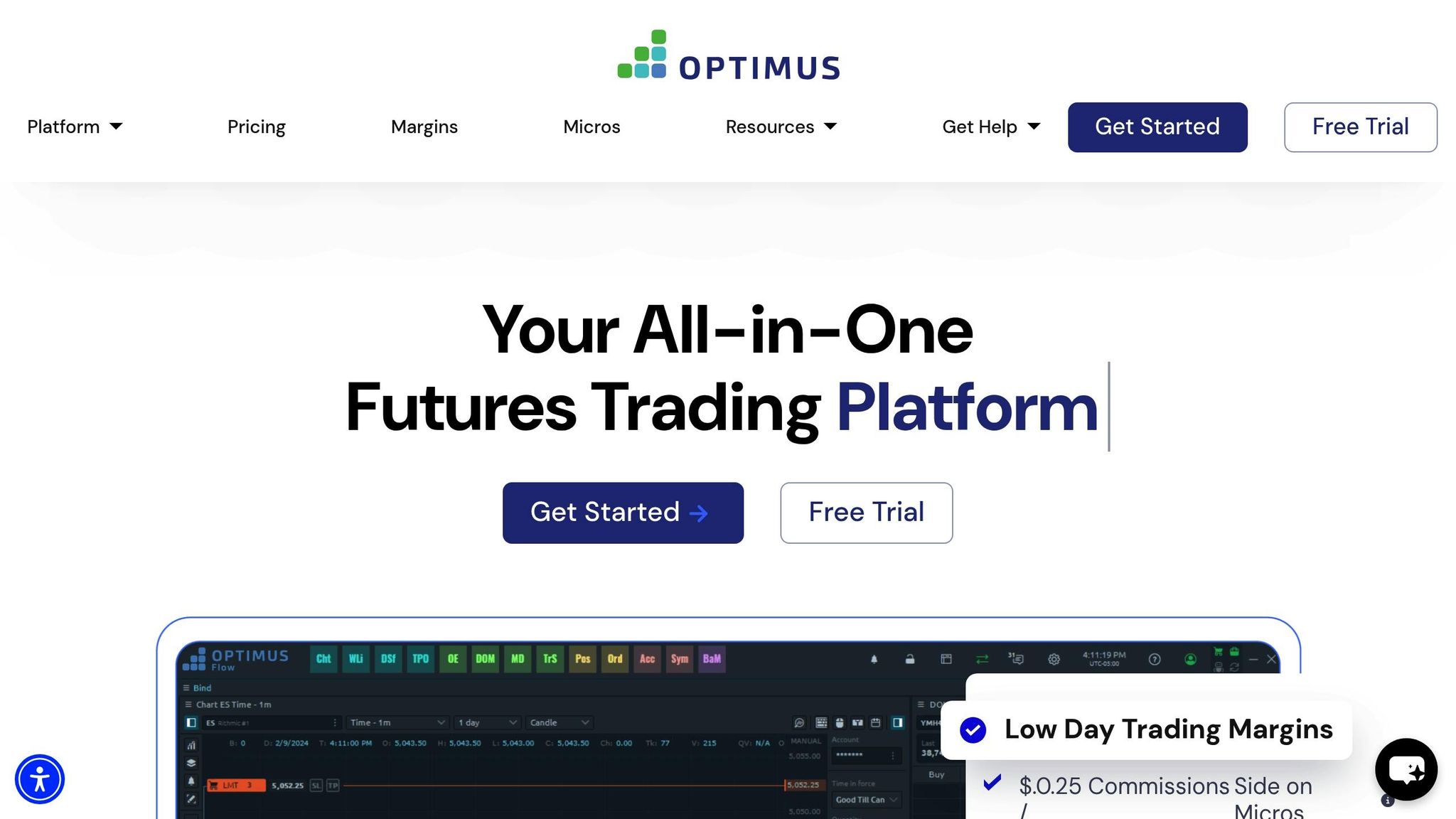
Optimus Futures stands out as a broker designed with active intraday futures traders in mind. Like other leading brokers, it prioritizes clear fees and reliable execution.
Execution Speed
With direct market access, Optimus Futures minimizes execution delays, ensuring orders are processed quickly and efficiently.
Fees and Margins
The broker offers straightforward and competitive commission rates, along with flexible margin requirements. These cost-effective options pair well with its diverse trading platforms.
Platform Features
Traders with Optimus Futures can access platforms like NinjaTrader, Sierra Chart, and Bookmap. These platforms offer advanced tools, including detailed charting, market depth analysis, and comprehensive order management. Features like stop-loss, bracket orders, and real-time risk management help traders stay in control of their positions.
Customer Support
Optimus Futures provides personalized customer service with dedicated account managers available during market hours. Support is accessible through multiple channels, and traders can benefit from educational resources such as webinars and tutorials.
5. Tradovate
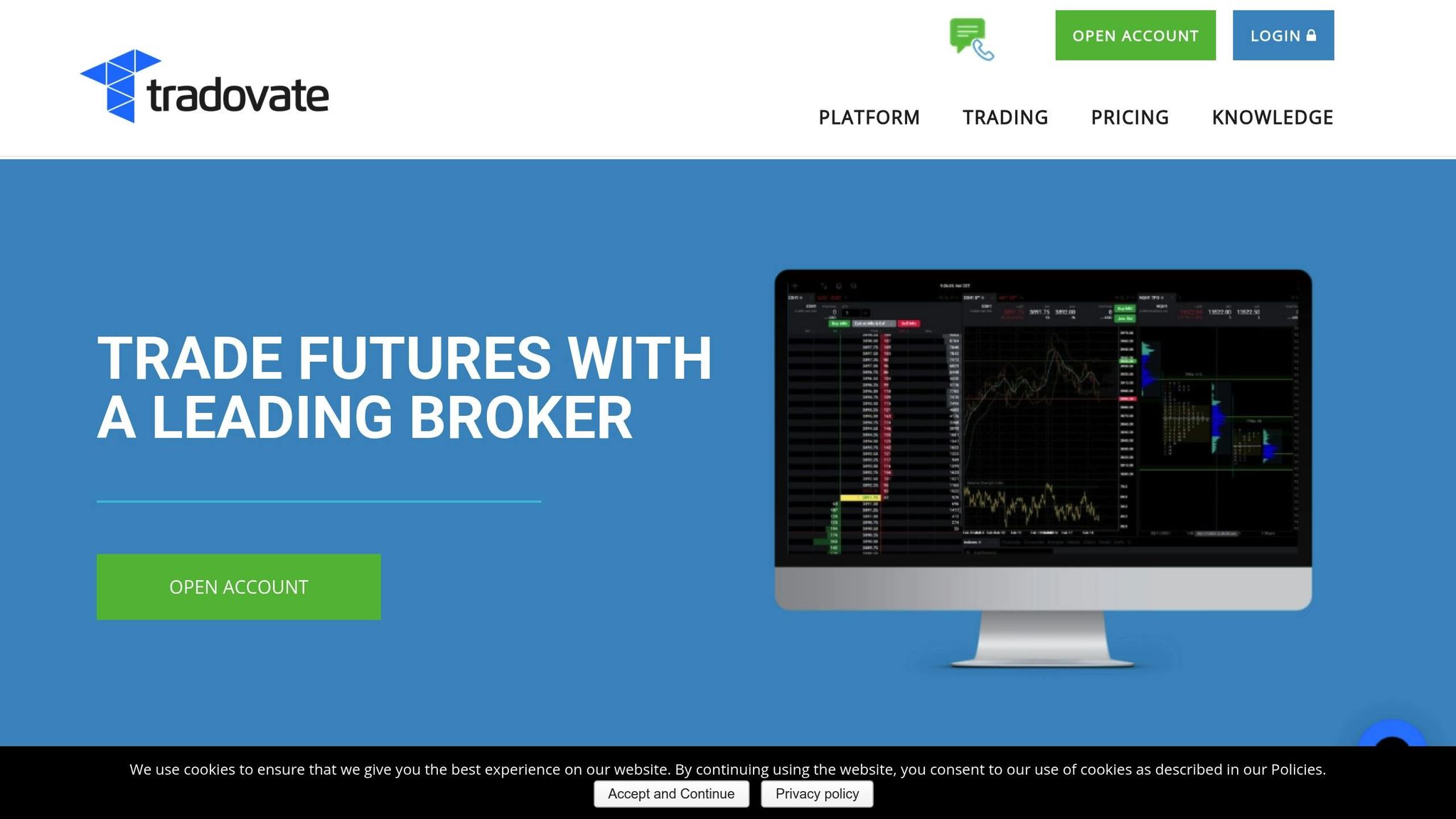
Tradovate takes a modern approach to futures trading with its web-based platform and mobile-first design. It focuses on making trading straightforward and accessible, especially for those who value ease of use.
Execution Speed
Tradovate stands out with its "One-Click Trading" feature, allowing traders to quickly enter and exit positions during fast-moving market conditions. The platform also includes native tick charts on both its web and desktop versions, catering to scalpers and active traders who need precise, real-time data. While it’s a strong option for most active traders, those requiring ultra-high-frequency execution or more advanced risk management tools might need to look elsewhere for specialized solutions. The combination of speed and user-friendly tools makes it a practical choice for many.
Platform Features
Designed with mobile users in mind, Tradovate offers a sleek interface and built-in simulators, giving traders an easy way to test strategies hands-on while staying on the go.
6. TradeStation
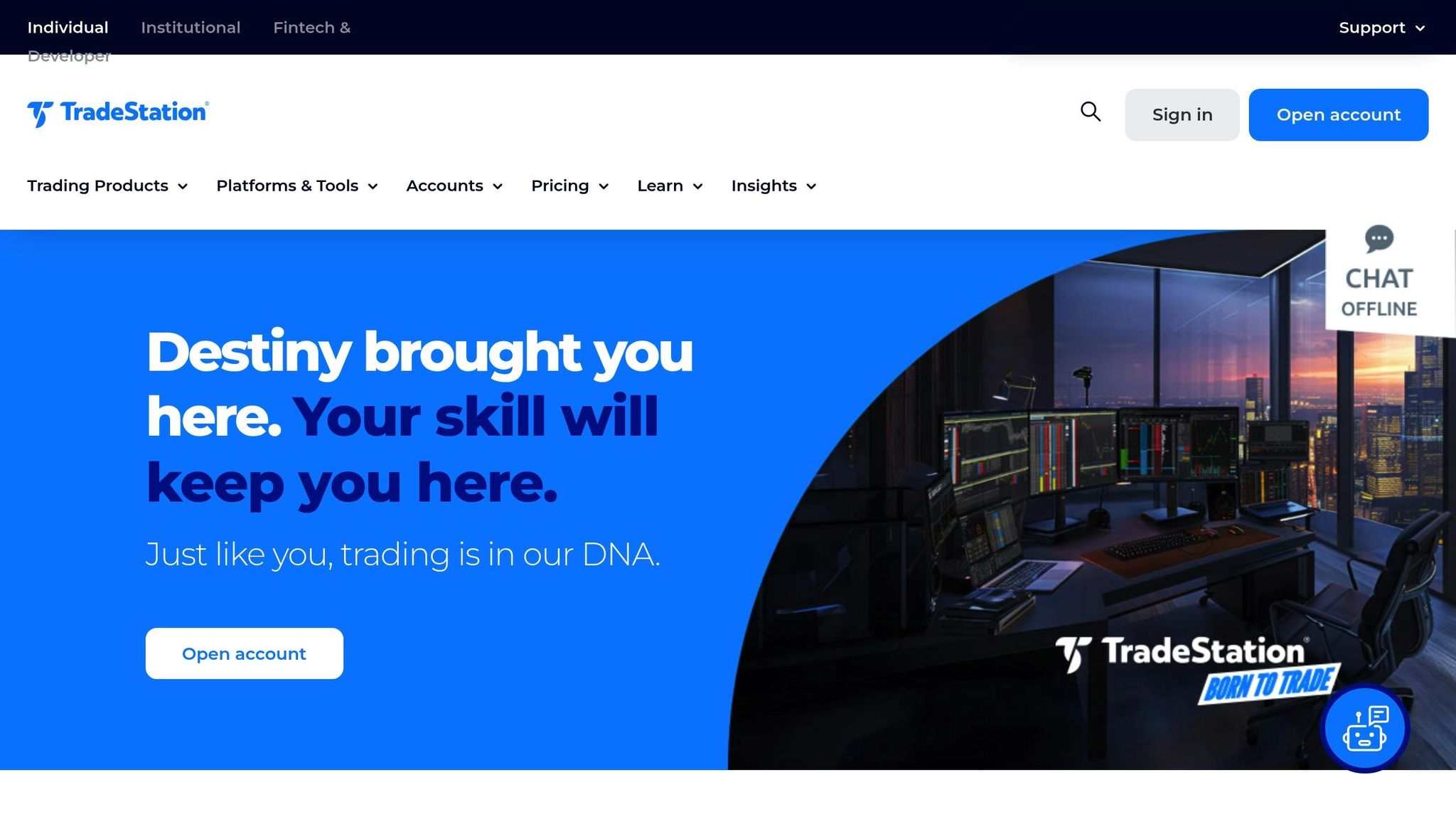
TradeStation combines robust analytics with competitive pricing, making it a go-to choice for active futures traders. Offering both desktop and web-based platforms, it caters to traders who prioritize speed, efficiency, and advanced tools. Here’s a closer look at its execution capabilities, pricing structure, features, and support.
Execution Speed
TradeStation is built for reliability and speed, delivering low-latency execution across major futures exchanges like CME, CBOT, and NYMEX. Its Matrix interface stands out, providing customizable hotkeys for lightning-fast order entry – a crucial advantage during market volatility. Additionally, features like bracket orders and OCO (One-Cancels-Other) orders help traders automate risk management, reducing the need for constant oversight.
Fees and Margins
TradeStation charges $1.50 per futures contract, with discounts kicking in for high-volume traders – dropping to $0.85 per contract after 300 monthly contracts. Accounts with a minimum balance of $2,000 enjoy zero platform fees. Margin requirements align with exchange minimums, and intraday margins are generally 25-50% lower than overnight requirements for major futures contracts, offering added flexibility for day traders.
Platform Features
The desktop platform is packed with tools designed for serious traders. It offers advanced charting capabilities, over 100 built-in technical indicators, and the ability to create custom tools using EasyLanguage. The RadarScreen feature scans hundreds of symbols in real time, making it easier to identify opportunities. For risk management, advanced order types like bracket and OCO orders are readily available.
On the go? The TradeStation mobile app ensures you’re not tied to your desk. It provides full order management, streaming quotes, and basic charting tools, seamlessly syncing with the desktop platform. Whether you’re at your desk or on the move, you can monitor positions and execute trades effortlessly.
Customer Support
TradeStation backs its platform with 24/5 customer support via phone, email, and live chat. Dedicated futures specialists are available to assist, and traders can benefit from educational resources like webinars, tutorials, and personalized onboarding to get up to speed quickly.
7. Webull
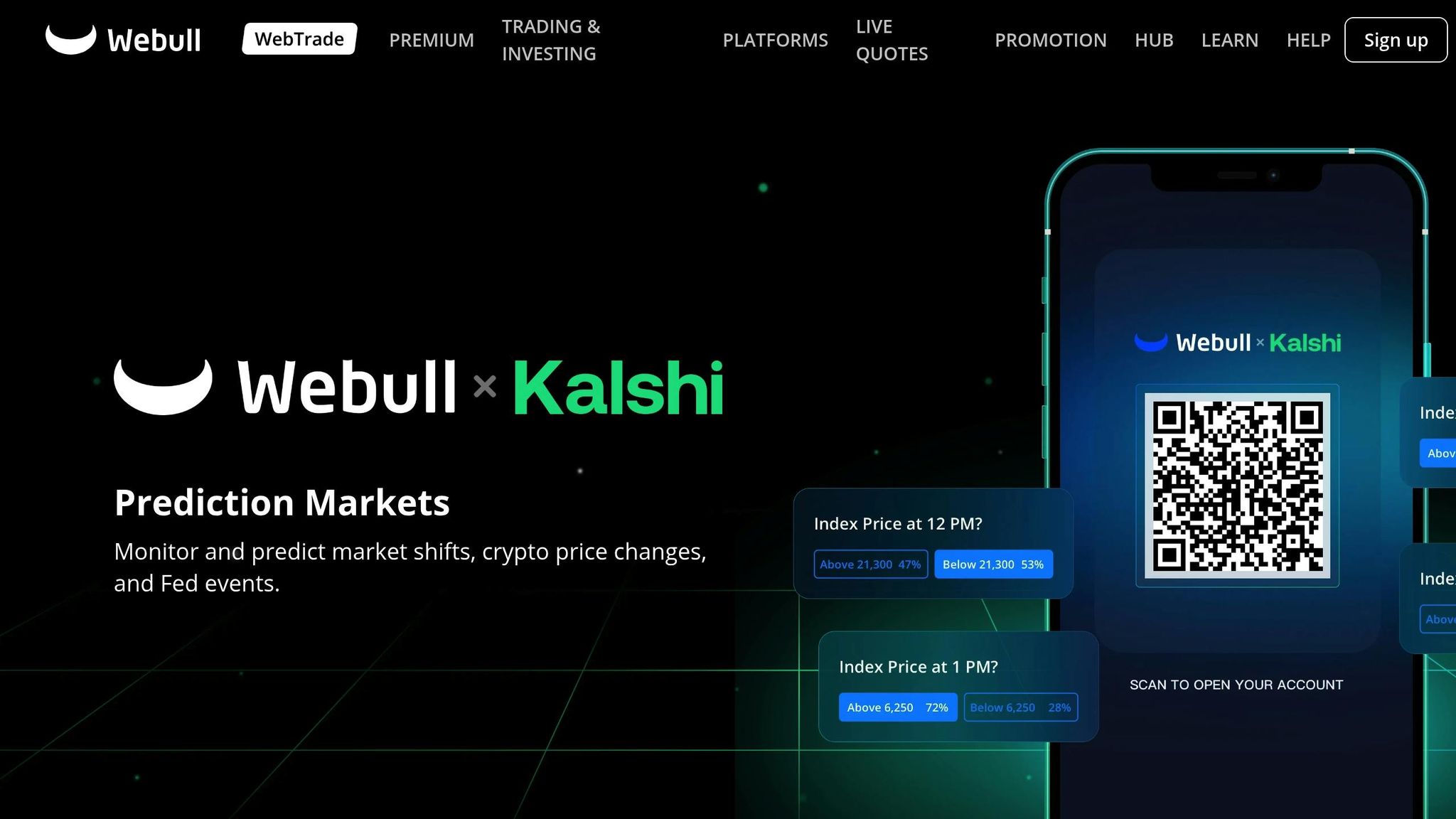
Webull has expanded its offerings to include futures trading, combining competitive pricing with modern technology aimed at intraday traders. While it’s best known for commission-free stock trading, Webull’s futures platform is designed to cater to active traders with a focus on usability and efficiency. Let’s take a closer look at how it performs for intraday strategies.
Execution Speed
Webull’s futures platform provides quick execution speeds thanks to direct market access to major exchanges such as CME, CBOT, and NYMEX. With smart order routing technology, it searches for the best available prices and reduces slippage, even during high-volume periods. While its speed may not rival institutional-grade systems, it’s reliable enough for most intraday strategies, with orders typically filled in milliseconds during normal trading conditions.
That said, advanced order types like bracket orders and algorithmic trading tools are somewhat limited compared to more specialized futures platforms. Still, for traders focused on straightforward execution, Webull delivers dependable performance.
Fees and Margins
Webull keeps its pricing simple, charging $2.09 per contract for most futures products without additional platform or data fees. This transparency makes it appealing to traders who want a clear understanding of their costs without worrying about hidden charges.
When it comes to margin requirements, Webull adheres to exchange standards. For intraday trading, margins are generally 20-40% lower than overnight requirements for key contracts like E-mini S&P 500 and crude oil futures. The minimum account balance to start trading futures is $2,000, making it an accessible option for newer traders who don’t have a large amount of capital but want to explore the futures market.
Platform Features
Webull’s platform goes beyond just speed and pricing by offering tools that enhance the trading experience. The desktop application includes real-time Level II market data, customizable charts with over 50 technical indicators, and integrated news feeds to keep traders updated on market events. The charting tools are straightforward and allow for quick analysis of price movements, helping traders pinpoint entry and exit opportunities.
The mobile app is another highlight, offering a clean, user-friendly interface with full trading functionality. From monitoring positions to executing trades and using advanced charting tools, everything can be done seamlessly on a smartphone. The app syncs effortlessly with the desktop platform, so your watchlists, alerts, and preferences stay consistent across devices.
For those who want to practice before trading live, Webull’s paper trading environment is a standout feature. It uses real market data to simulate actual trading conditions, allowing traders to test strategies with virtual funds. This is especially helpful for those new to futures trading or experimenting with new approaches.
Customer Support
Webull provides live chat, email, and phone support during market hours. While it doesn’t offer 24/7 assistance like some specialized futures brokers, the support team is knowledgeable about futures trading and can help with everything from account setup to platform navigation and general trading questions.
The platform also includes a variety of educational resources tailored to futures trading. These resources – ranging from video tutorials and webinars to in-depth articles – cover topics from basic concepts to advanced strategies. This makes Webull a solid option for traders transitioning from stock trading to futures, as they can learn while they trade. The combination of accessible support and educational tools makes Webull a strong choice for active intraday futures traders.
Broker Comparison: Pros and Cons
Finding the right broker for intraday futures trading means weighing factors like execution speed, costs, platform features, and support. Below, we’ve outlined the pros and cons of popular brokers, along with a deeper dive into their performance in key areas.
| Broker | Pros | Cons |
|---|---|---|
| NinjaTrader | • Advanced charting tools with a variety of indicators • Comprehensive algorithmic trading capabilities • Strong community and third-party integrations |
• Steep learning curve for beginners • Additional fees for advanced platform features • Limited mobile functionality compared to desktop |
| AMP Futures | • Very low commissions with competitive pricing • Direct market access to major exchanges • 24/7 customer support • Multiple platform options (e.g., NinjaTrader, TradingView, Sierra Chart) |
• Basic proprietary platform features • Higher margin requirements on select contracts • Limited educational resources for beginners |
| Interactive Brokers | • Top-tier execution technology • Access to global markets across numerous exchanges • Advanced risk management tools |
• Complicated fee structure with monthly minimums • Interface may overwhelm casual traders • High initial deposit required for futures trading |
| Optimus Futures | • Transparent pricing with no hidden fees • Excellent customer service during trading hours • Integration with multiple platforms • Educational webinars and market analysis |
• Limited proprietary platform features • No 24/7 support availability • Fewer advanced order types compared to specialized platforms |
| Tradovate | • Cloud-based platform accessible from anywhere • User-friendly interface • Real-time social trading features |
• Relatively new platform with a shorter track record • Limited third-party integrations • Smaller historical data library compared to older brokers |
| TradeStation | • Powerful proprietary platform with advanced analytics • EasyLanguage programming for custom strategies • Robust backtesting tools • Strong research and market analysis features |
• Higher costs for active traders due to platform fees • Complex platform that requires significant learning time • Limited customer support hours |
| Webull | • Transparent per-contract pricing • Excellent mobile app functionality • No platform or data fees • Strong paper trading features |
• Limited advanced order types • Relatively new to the futures market • Basic algorithmic trading capabilities |
Execution Speed Comparison
When it comes to execution speed, Interactive Brokers and NinjaTrader stand out with fast order routing, even under normal market conditions. AMP Futures and Optimus Futures deliver reliable mid-tier performance, while platforms like Tradovate, TradeStation, and Webull generally handle most intraday strategies well but may lag during high-volatility periods.
Cost Structure Analysis
For traders focused on minimizing costs, AMP Futures offers some of the lowest commission rates, followed by Tradovate. However, margin requirements can impact the overall cost. Webull’s all-inclusive pricing model eliminates surprise charges, making it a straightforward choice for cost-conscious traders.
Platform Sophistication
For advanced traders, NinjaTrader and TradeStation provide robust tools like custom indicator development and detailed backtesting. Interactive Brokers offers institutional-level features but requires more experience to navigate. On the other hand, Tradovate and Webull prioritize simplicity and accessibility, which may appeal to newcomers, though they lack some high-end functionalities.
Support and Education
Customer support and educational resources can make a big difference, especially for newer traders. AMP Futures and Optimus Futures excel in personalized service, often providing direct access to experienced professionals. Interactive Brokers offers extensive educational materials but less direct support. Meanwhile, Webull focuses on educational content tailored to traders transitioning from stock trading to futures.
The best broker for you depends on your trading goals, experience level, and budget. High-frequency traders might prefer NinjaTrader or Interactive Brokers for their speed and advanced tools. If keeping costs low is your priority, AMP Futures or Tradovate could be the way to go. Beginners often find platforms like Webull or Tradovate a good starting point before exploring more complex options.
Final Thoughts
Choosing the right trading platform comes down to a few key factors: execution speed, costs, and platform features. If you’re a speed-focused trader, you’ll want a platform that prioritizes fast execution. On the other hand, if keeping costs low is your main concern, look for brokers with competitive commission rates. For some, simplicity and ease of use will outweigh everything else.
For beginners in futures trading, platforms with user-friendly interfaces and solid mobile apps are a great starting point. These options strip away unnecessary complications while still offering the tools needed for effective intraday trading.
Experienced traders, however, often require more advanced tools – like algorithmic trading features and comprehensive backtesting options. For those working with intricate strategies, institutional-grade risk management tools are also a must.
Support and accessibility can make a big difference, too. Having access to knowledgeable professionals during active trading sessions can be a lifesaver when quick answers are needed.
Ultimately, your choice should align with your trading volume, experience, and strategy. High-frequency scalpers will benefit most from platforms offering speed and advanced order types. Swing traders, who focus on longer-term moves, might prioritize global market access. Meanwhile, budget-conscious traders with moderate activity often look for the best balance between cost and functionality.
If you’re unsure, take advantage of demo accounts to test different platforms. What feels seamless for one trader might not suit another. The best platform is the one that executes your strategy efficiently while keeping expenses under control.
FAQs
What should I look for in a broker for intraday futures trading?
When you’re picking a broker for intraday futures trading, there are a few things you really need to keep in mind. Start with regulation and reliability – you want a broker you can trust. Then, think about execution speed and platform quality, since quick and smooth trades are a must in the fast-moving world of short-term trading. It’s also wise to check if the broker offers competitive fees, a variety of order types, and solid access to market data, all of which are key to executing your trading strategies effectively.
Don’t overlook customer support – having quick help available when you need it can be a lifesaver during active trading sessions. Look for features that cater to high-frequency traders, like advanced charting tools, customizable interfaces, and smooth order execution. Picking a broker that matches your trading needs can have a big impact on your overall performance.
Why are execution speed and platform features so important for intraday futures trading?
When it comes to intraday futures trading, execution speed and platform features are absolutely crucial. Fast execution ensures your trades are filled at the price you expect, which is especially important in volatile markets where prices can shift within milliseconds. The quicker your trades are executed, the less likely you are to face slippage, which can chip away at your profits.
Equally important are the tools and features your trading platform offers. Access to real-time data, advanced order types, and user-friendly tools allows you to make smarter decisions, manage risks more effectively, and respond to market movements without hesitation. Together, these elements can make a big difference, helping you capture more opportunities and avoid unnecessary losses – key ingredients for success in short-term trading.
What are the pros and cons of using mobile-first platforms like Tradovate or Webull for intraday futures trading?
Mobile-first trading platforms like Tradovate and Webull bring several perks to the table for intraday futures traders. For starters, they offer easy accessibility – you can trade from virtually anywhere. Their intuitive interfaces and tools tailored for active trading also make it easier to act quickly, whether you’re executing orders or making split-second decisions. For traders on the move, this level of convenience is hard to beat.
That said, there are a few downsides to keep in mind. These platforms might not have the advanced features or deep customization options that seasoned professionals often rely on. Plus, during periods of heavy market activity, you could run into issues with execution speed or platform stability – something that can make or break high-frequency trading strategies. Ultimately, it’s worth assessing whether a mobile-focused platform fits your trading style and goals.








